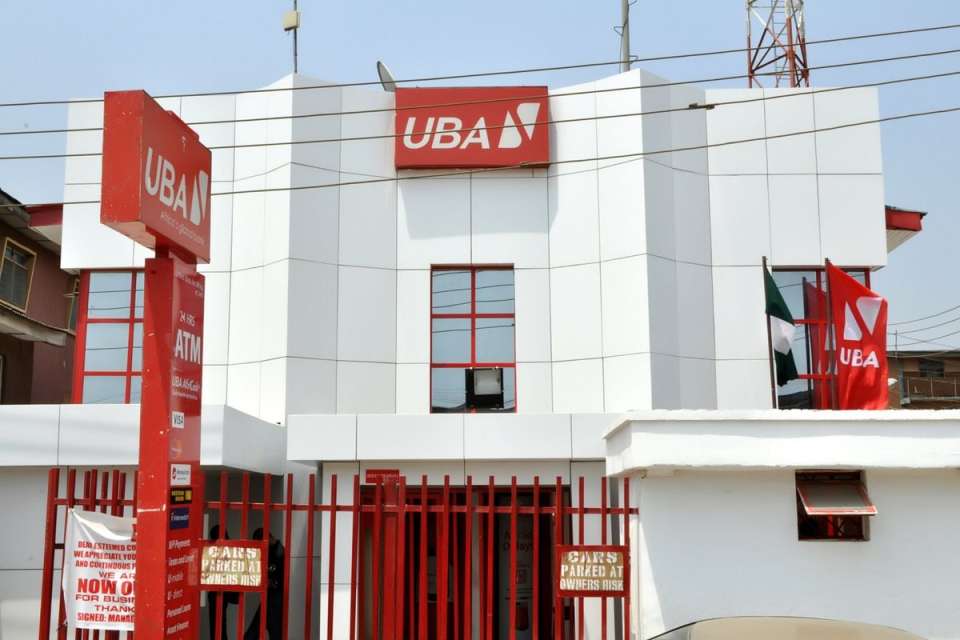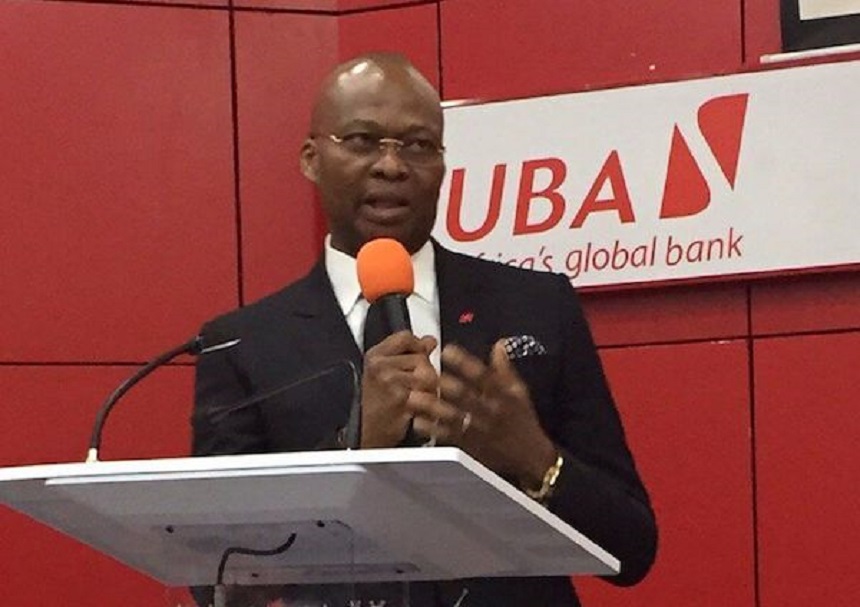Banking
Fitch Affirms UBA at ‘B’ with Stable Outlook

By Modupe Gbadeyanka
Fitch Ratings has affirmed United Bank for Africa Plc’s (UBA) Long-Term Issuer Default Rating (IDR) at ‘B’. The Outlook is Stable. The bank’s Viability Rating (VR) has been affirmed at ‘b’ and its Support Rating at ‘5’. The National Ratings have also been affirmed. A full list of rating actions is at the end of this rating action commentary.
The bank’s IDRs are driven by its standalone creditworthiness, defined by the VR. The VR is constrained by Nigeria’s (B+/Negative) operating environment.
UBA is one of Nigeria’s largest banks, classified as domestically systemic by the regulator. It controls shares of loans and deposits in Nigeria of 7.5% and 9.5%, respectively. Its well-established franchise is a rating strength and internationalisation through expansion into 19 other sub-Saharan African countries adds to the franchise.
UBA’s earnings and profitability tend to be stable, which we view positively.
The bank reports a low impaired loans/gross loans ratio (around 4%), but loan loss cover at around 70% is on the low side compared with the average for large Nigerian banks (90%). UBA also has access to collateral. Corporate lending dominates the loan book, but much of it is collateralised. UBA’s exposure to the oil and gas sector represents 20% of total loans, lower than the 30% sector average but concentrations by single borrower can be high. This is particularly the case in some of the African subsidiaries.
UBA’s foreign currency liquidity position improved following the issue of a USD500 million senior medium-term bond on the international capital markets in June 2017. UBA’s local currency funding profile is a rating strength. The group is largely funded by historically stable deposits and UBA’s strategy is to continue to expand its low-cost retail deposit base. Retail deposits represent about a third of customer deposits, which is higher than average for rated peers. Local currency liquidity ratios are high.
UBA’s capital ratios are in line with other large Nigerian banks but the bank’s overall capitalisation still provides relatively narrow buffers and only limited loss-absorption capacity, in our view. This is because concentrations can be high, exposing the bank to the risk of unexpected losses.
UBA’s National Ratings reflect its creditworthiness relative to Nigeria’s best credit and to peers operating in Nigeria.
SUPPORT RATING AND SUPPORT RATING FLOOR
Fitch believes that sovereign support to Nigerian banks cannot be relied on given Nigeria’s weak ability to provide support, particularly in foreign currency. In addition, there are no clear messages from the authorities regarding their willingness to support the banking system. Therefore, the Support Rating Floor of all Nigerian banks is ‘No Floor’ and all Support Ratings are ‘5’. This reflects our view that senior creditors cannot rely on receiving full and timely extraordinary support from the Nigerian sovereign if any of the banks become non-viable.
SENIOR DEBT
Senior debt is rated at the same level as the bank’s Long-Term IDR because in our view, the likelihood of default on these notes reflects the likelihood of default of the bank. The Recovery Rating (RR) assigned to these notes is ‘RR4’, indicating average recovery prospects.
The bank’s IDRs, National Ratings and VR are primarily sensitive to either improvements or deterioration in asset quality and capital adequacy. Given the still fragile economy in Nigeria and credit weakness in many other sub-Saharan African countries, upgrade potential is considered limited at present.
The SR is potentially sensitive to any change in assumptions around the propensity or ability of the sovereign to provide timely support to the bank.
The senior debt is sensitive to a change in UBA’s Long-Term IDR.
The rating actions are as follows:
Long-Term IDR affirmed at ‘B’; Outlook Stable
Short-Term IDR affirmed at ‘B’
Viability Rating affirmed at ‘b’
National Long-Term Rating affirmed at A+(nga)’
Short-Term National Rating affirmed at ‘F1(nga)’
Support Rating affirmed at ‘5’
Support Rating Floor affirmed at ‘NF’
Long-term senior unsecured debt affirmed at ‘B’/RR4
Banking
All Set for Second HerFidelity Apprenticeship Programme

By Modupe Gbadeyanka
Registration for the second HerFidelity Apprenticeship Programme (HAP 2.0) organised by Fidelity Bank Plc has commenced.
The Divisional Head of Product Development at Fidelity Bank, Mr Osita Ede, informed newsmen that the initiative was designed to empower women with sustainable entrepreneurship skills.
The lender created the flagship women-empowerment initiative to equip women with practical, income‑generating skills and structured pathways to entrepreneurship.
“HerFidelity Apprenticeship Programme 2.0 reflects our commitment to continuous improvement. Having evaluated feedback from the first edition, we have returned with stronger partnerships and deeper mentorship programmes to ensure that women acquire not just skills, but sustainable economic opportunities,” he said.
“At the heart of the programme is guided, real‑world learning. Participants will undergo intensive apprenticeship training under reputable institutions and industry experts across select fields such as hair styling, shoe making, auto mechatronics, and interior decoration,” Mr Ede added.
He noted that HerFidelity Apprenticeship Programme 2.0 goes beyond skills acquisition by offering participants a wide range of business advisory services. These include business and financial literacy training, mentorship support throughout the apprenticeship journey, access to Fidelity Bank’s women‑focused and SME financial solutions, as well as guidance on business formalisation and growth strategies.
Further emphasising the bank’s vision, Mr Ede said, “By integrating structured mentorship with entrepreneurial development, Fidelity Bank is positioning women not just as trainees, but as future employers, innovators, and economic contributors within their communities. This aligns with our mandate to help individuals grow, businesses thrive, and economies prosper.”
Banking
The Alternative Bank Opens New Branch in Ondo

By Modupe Gbadeyanka
A new branch of The Alternative Bank (AltBank) has been opened in Ondo State as part of the expansion drive of the financial institution.
A statement from the company disclosed that the new branch would support export-oriented agribusinesses through Letters of Credit and commodity-backed trade finance, ensuring that local producers can scale beyond state borders.
For SMEs, the bank is introducing robust payment rails, asset financing for equipment and inventory, and supply chain-backed facilities that strengthen working capital without trapping businesses in interest-based debt cycles.
The Governor of Ondo State, Mr Lucky Aiyedatiwa, represented by his Chief of
Staff, Mr Olusegun Omojuwa, at the commissioning of the branch, underscored the importance of financial institutions in economic development.
“The pivotal role of financial institutions to economic growth and development of any economy cannot be overemphasised. It provides access to capital, supporting small and medium-scale enterprises and encouraging savings.
“Therefore, I have no doubt in my mind that the presence of The Alternative Bank in Ondo State will deepen financial services, create employment opportunities and stimulate economic activities across various sectors,” he said.
In her remarks, the Executive Director for Commercial and Institutional Banking (Lagos and South West) at The Alternative Bank, Mrs Korede Demola-Adeniyi, commended the state government’s leadership and outlined the lender’s long-term vision for Ondo State.
“As Ondo State steps into its next fifty years, and into the future anchored on the sustainable development championed during the recent anniversary celebrations, The Alternative Bank is here to be the financial engine for that vision. We didn’t come to Akure to hang banners. We came to fund work, farms, shops, and factories.”
With Ondo State’s economy anchored largely on agriculture, particularly cocoa production, poultry farming, and other cash crops, alongside a growing SME and trade ecosystem, AltBank is deploying sector-specific financing solutions tailored to these strengths.
For cocoa aggregators, processors and poultry operators, the bank will provide production financing, facility expansion support, machinery lease structures, and structured trade facilities under its joint venture and cost-plus financing models, with transaction cycles of up to 180 days for commodity trades and longer-term structured asset financing for equipment and infrastructure.
The organisation is a notable national non-interest bank with a physical network now surpassing 170 locations, deploying capital to solve real-world challenges through initiatives such as the Mata Zalla project, which saw to the training of hundreds of women as electric tricycle drivers and mechanics.
Banking
Recapitalisation: 20 Nigerian Banks Now Fully Compliant—Cardoso

By Adedapo Adesanya
The Governor of the Central Bank of Nigeria (CBN), Mr Yemi Cardoso, announced on Tuesday that the country’s banking sector is making strong progress in the recapitalisation drive, with 20 banks now fully compliant.
Mr Cardoso disclosed this during a press conference at the first Monetary Policy Committee (MPC) meeting of 2026, where he also highlighted positive developments in the nation’s foreign reserves.
On March 28, 2024, the apex bank announced an increase in the minimum capital requirements for commercial banks with international licences to N500 billion.
National and regional financial institutions’ capital bases were pegged at N200 billion and N50 billion, respectively.
Also, CBN raised the merchant bank minimum capital requirement to N50 billion for national licence holders.
The banking regulator said the new capital base for national and regional non-interest banks is N20 billion and N10 billion, respectively.
To meet the minimum capital requirements, CBN advised banks to consider the injection of “fresh equity capital through private placements, rights issue and/or offer for subscription”.
Following the development, several banks announced plans to raise funds through share and bond issuances.
In January, Zenith Bank said it had raised N350.46 billion through rights issue and public offer to meet the CBN minimum capital requirement.
Guaranty Trust Holding Company Plc (GTCO), on July 4, said it had successfully priced its fully marketed offering on the London Stock Exchange (LSE).
In September, the CBN governor said 14 banks fully met their recapitalisation requirements — up from eight banks in July.
With one month to the central bank’s March 31, 2026, recapitalisation deadline, 13 Nigerian lenders are yet to cross the finish line.
Additionally, the governor noted that 33 banks have raised funds as part of the ongoing recapitalisation exercise, signalling robust capital mobilisation across the sector.
He stated that gross foreign reserves have climbed to a 13-year high of $50.4 billion as of mid-February 2026.
-

 Feature/OPED6 years ago
Feature/OPED6 years agoDavos was Different this year
-
Travel/Tourism10 years ago
Lagos Seals Western Lodge Hotel In Ikorodu
-

 Showbiz3 years ago
Showbiz3 years agoEstranged Lover Releases Videos of Empress Njamah Bathing
-

 Banking8 years ago
Banking8 years agoSort Codes of GTBank Branches in Nigeria
-

 Economy3 years ago
Economy3 years agoSubsidy Removal: CNG at N130 Per Litre Cheaper Than Petrol—IPMAN
-

 Banking3 years ago
Banking3 years agoSort Codes of UBA Branches in Nigeria
-

 Banking3 years ago
Banking3 years agoFirst Bank Announces Planned Downtime
-

 Sports3 years ago
Sports3 years agoHighest Paid Nigerian Footballer – How Much Do Nigerian Footballers Earn













